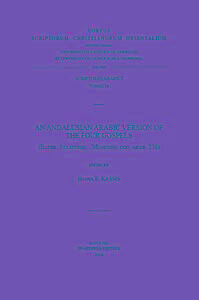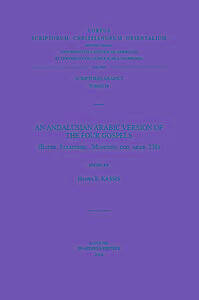
- Retrait gratuit dans votre magasin Club
- 7.000.000 titres dans notre catalogue
- Payer en toute sécurité
- Toujours un magasin près de chez vous
- Retrait gratuit dans votre magasin Club
- 7.000.0000 titres dans notre catalogue
- Payer en toute sécurité
- Toujours un magasin près de chez vous
An N Andalusian Arabic Version of the Four Gospels
(Bayer. Staatsbibl., Munchen, Cod. Arab. 238)
He Kassis
126,00 €
+ 252 points
Description
Within one year of the conquest of Spania (AD 711), the Muslim conquerors struck coins, with legends in Latin, demonstrating the tenets of their faith: 'In the Name of God; there is no deity other than God, Alone, without compeer'. This proclamation was followed by a bilingual mint, drawn from the Qur'an: 'He is God, Unique, God Everlasting, He who has not begotten, and who has not been begotten, and equal to Him is not any one' (Qur'an 112). Then solely in Arabic, the coins replaced the legend Spania with al-Andalus. As the Christian population of Al-Andalus became increasingly arabicised, the need for translating their sacred scriptures into Arabic undoubtedly ensued. It is interesting to note that article 26 of the Fourth Council of Toledo (AD 633) had decreed that when priests were assigned to their districts (parishes), the bishops were to provide them each with a copy of the Gospels so that, having mastered the teachings of the Gospels, the priests would not err in the application of God's law and intent. An Arabic translation of the Scriptures - particularly the Gospels - would meet that requirement and satisfy a growing need of the priesthood and the faithful laity - non-conversant in Latin - to read and hear the sacred text in the language that they comprehended best.
Spécifications
Parties prenantes
- Auteur(s) :
- Editeur:
Contenu
- Nombre de pages :
- 438
- Langue:
- Anglais
- Collection :
- Tome:
- n° 663
Caractéristiques
- EAN:
- 9789042933248
- Date de parution :
- 19-09-16
- Format:
- Livre broché
- Format numérique:
- Trade paperback (VS)
- Dimensions :
- 160 mm x 239 mm
- Poids :
- 716 g

Les avis
Nous publions uniquement les avis qui respectent les conditions requises. Consultez nos conditions pour les avis.






